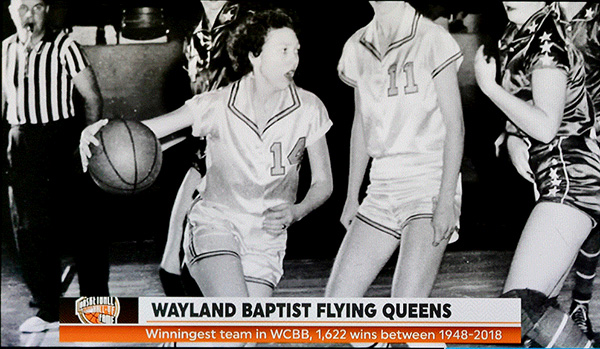
Ask her daughter Angela, and she’ll tell you the best word to describe Rita Colman is determination.
Rita Alexander Colman was born and raised in a small town in Oklahoma. Because it was the only sport available to girls, Rita played basketball as a young woman – and WOW, she could play! After graduating high school in 1953, she was offered the opportunity to play basketball for Wayland Baptist College (now Wayland University) in Plainview, Texas. She attended Wayland from 1953 through 1957 and had a hugely successful four-year run on the women’s team. During her time there, she won 104 straight basketball games as part of the Flying Queens!
After college, Rita moved to Houston and began teaching. Soon after, she was invited to join the U.S. team in a world tournament in Rio de Janeiro. While she was there, she met her future husband George in 1957, and the two married in June of 1958. Rita and George raised two daughters, Phyllis and Angela, and lived all around the world because of George’s career.
In the early 1990’s, Rita was diagnosed with macular degeneration, and she eventually needed to have cataract surgery, which was very successful. Later on, she suffered a dislodged lens after surgery to repair the lens, the pressure in one of her eyes was sky-high. Her doctor walked her from his office to the office next door — Glaucoma Associates of Texas. It was there that she met Dr. Tosin Smith. After consulting with Dr. Smith and trying a treatment with eye drops and two subsequent laser procedures to keep her eye pressure down and prevent vision loss in her stronger eye, Rita decided to have a stent placed in her eye to relieve the pressure. She went into surgery hoping to regain her full eyesight, but unfortunately vision loss from her macular degeneration is irreversible. Rita’s optic nerve is healthy, and the pressure is managed, but she can only see peripherally, just not straight forward.
Today, Rita is determined to find solutions that allow her to live her life as normally as possible despite her vision limitations. She uses tools that help her in her daily life such as audio books and a program called Vocally for phone calls. Vocally dials numbers with a verbal command. Rita also uses Amazon Alexa for help. She tried a tool that fits on top of eyeglasses and shifts the peripheral vision to the area of the eye that cannot see as clearly.

Unfortunately, this tool did not work for Rita, but she’s always looking for something new that might be helpful. Rita’s newest quest is to find something that allows her to change the television channel with a verbal command. Her daughter Phyllis is doing research so that Rita can implement a tool once she and her daughters decide on a direction. She’ll try anything that provides hope for better vision.
Keeping a good attitude is important to success as well. Rita believes in a clean diet and understands that her vision issues are probably less severe due to her eating habits. When she was diagnosed with macular degeneration, she started eating broccoli every day and still does – every single day.
Her daughters, Phyllis and Angela are her “gems,” and Rita says her granddaughters (both in their early twenties) are very attentive to her as well. Rita’s best advice is to find a doctor you like and follow the doctor’s orders. If you receive a diagnosis indicating that your vision will decline, look for ways to handle the challenges ahead. From audio books to magnifiers, there are many tools that are available for the visually impaired.

 DONATE NOW
DONATE NOW